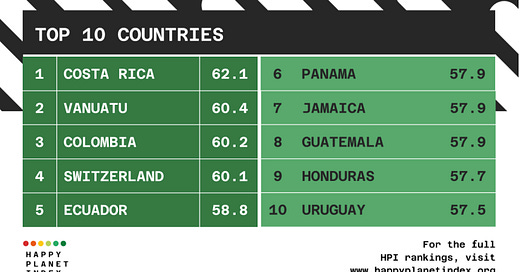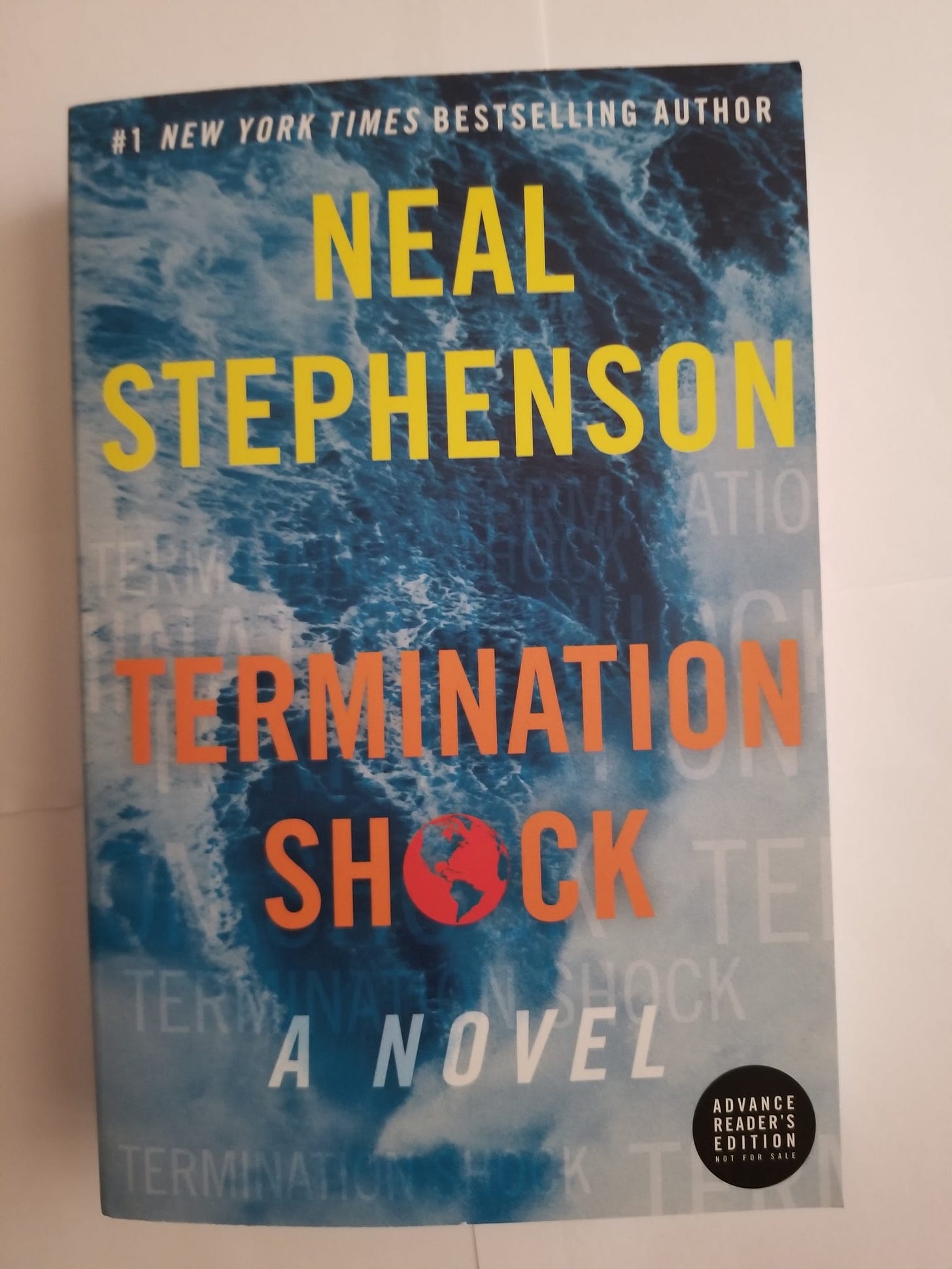15 December 2021. Wellbeing | Sci-fi
This year’s ‘Happy Planet’ numbers | Neal Stephenson’s new novel is a near future techno-thriller about climate change.
Welcome to Just Two Things, which I try to publish daily, five days a week. Some links may also appear on my blog from time to time. Links to the main articles are in cross-heads as well as the story.
#1: This year’s Happy Planet numbers
Wellbeing
I’ve been meaning to write about the Happy Planet Index since the latest table came out at the end of October. It’s mostly based on 2019 data, with some 2020 numbers.
The Index was developed by the New Economics Foundation back in the 2000s as a way to measure other national outcomes than GDP, including longevity and planetary impact (the ‘Happy’ in the Happy Planet Index refers to the planet, not to people. It’s not all about us.)
The Index combines longevity, well-being and ecological footprint, on the basis that the actual outcome we want as people is to live long, happy lives—and the outcome that future generations want is that we don’t trash the planet for them in the meantime.
In short: it is a country’s wellbeing, multiplied by their life expectancy, divided by their ecological footprint.
The HPI gives us an idea of whether or not a country’s wellbeing is ‘sustainable’, by looking at how much of the fundamental ‘input’ – ecological footprint (the pressure we put on the planet) – is used to create the ultimate ‘output’ we’re looking for – long, happy lives.
The way it is calculated effectively upweights countries with a lower ecological footprint.
Slightly technically, Wikipedia describes what the index does like this:
In effect it operationalises the IUCN's (World Conservation Union) call for a metric capable of measuring 'the production of human well-being (not necessarily material goods) per unit of extraction of or imposition upon nature'.
It’s also worth noting that the Index doesn’t make strong claims about the precision of the numbers: it’s designed as a way of indicated a direction of travel and relative success in heading towards it.
it simply aims to act as a compass that points towards a new vision of progress for the economy
Life expectancy
In 2021, the life expectancy data, drawn from the UN, shows that while richest countries have most longevity, other countries are catching up fast. “Chile and Costa Rica have life expectancy rates over 80 years – and Lebanon’s 79 year life expectancy is higher than the USA.” (Yes, this last data point surprised me at first.)
Subjective wellbeing
Finland is top of the pile globally for subjective wellbeing (the data comes from the Gallup World Poll). Perhaps more importantly, subjective wellbeing doesn’t always correlate with GDP. Costa Rica and Vanuatu both report higher wellbeing scores than the US on much lower GDP (I’m guessing that is probably GDP per head). And although East Asia has high life expectancy, that doesn’t map across to high wellbeing scores.
Ecological footprint
When you look at all of this through the lens of ecological footprint (data: Global Footprint Network), generally countries with high life expectancy and good subjective wellbeing scores are living beyond ecological limits. And vice versa—“Africa and South Asia, with lower rates of wellbeing, have ecological footprints within the Earth’s biocapacity”.
Some exceptions: “Ecuador, Armenia, and Sri Lanka each had high life expectancy with low (sustainable) ecological footprints”.
The overall results in 2021 look like this:
The HPI launch article also had a useful collection of summary headlines:
- Latin America is mostly in the green – the best performing world region on the HPI – outperforming wealthier countries like in North America.
- A lot of European countries also came up green – mainly due to declines in ecological footprint – with Switzerland rising to the top 5!
- While its ecological footprint has declined, the USA is still performing ‘inefficiently’ at 122nd place. It still uses over 5 planets worth of resources.
- Some world regions saw HPI scores rise – Western Europe, due to declining ecological footprints and Africa due to rapidly rising life expectancy without the same kind of rise in ecological footprint.
- The index increased by 3 points in 2019 since 2016 – meaning that we are becoming more efficient at delivering longer, happier lives with fewer environmental resources.
So at one level this might be one of the planetary ‘good news’ story that the late Hans Rosling was keen for us to notice, even if the rate of progress isn’t quite as fast as we might like.
Of course, the Index has its critics, although some of these probably ought to be worn as a badge of pride: the dark-funded British “Tax Payers Alliance”, for example, or the hardline pro-marketeers at the Adam Smith Institute.
There are more interesting critiques out there that—working in the spirit of the Index—seek to improve the quality of the outcomes. This paper seeks to create a Happier Planet Index by adding back in the Global Peace Index, on the grounds that stability and lack of conflict is a significant component of happiness. Some of the discussion is quite technical, but the outcomes don’t change as much as you might expect.
If you want to spend more time with the Happy Planet Index, the interactive guide is probably the best place to start.
#2: Neal Stephenson’s latest novel, Termination Shock, reviewed.
A guest post by Bryan Alexander
The science fiction writer Neal Stephenson has had quite a lot of exposure recently as the writer who first coined the idea of the “metaverse,” 30 years ago. He has a new novel out—reviewed on Goodreads by Bryan Alexander, who gave me permission to republish a version of that piece here. I’ve taken out the spoilers (AC).
Termination Shock is a near-future science fiction novel/technothriller about climate change. Specifically, it imagines a geoengineering project designed to reduce the Earth's heating, and how it might play out globally.
To tell this story, Neal Stephenson assembles a global cast and sends them on a lot of travel. The main locales are West Texas, the Netherlands, and New Guinea.
Stylistically, Termination Shock is very Stephenson, full of his classic wry humor, deep dives into topics, feats of martial arts, lots of engineering, and a geek's view of human interactions.
Without getting into spoilers, I can describe the book's first half, which is mostly stage-setting for the second. A Texan zillionaire sets up an enormous gun (seriously)—very Jules Verne, I think—to blast sulfur into the stratosphere, shows it off to a global audience, then starts the vast machine going. It's a fait accompli. Stopping it would suddenly warm the Earth even more, which is what the title term describes.
That global audience includes leaders from London and Venice, as cities especially sensitive to the sea level rise aspect of climate change. The main part of that audience is a crew from the Netherlands, including its queen, and their actions and reflections take up most of the rest of the story. A B-plot involves a Sikh martial artist who trains, then fights dramatically against Chinese competitors for the Punjab.
Overall, this is an engaging novel. It explores a real-world problem - geoengineering - and does so with political imagination and technical expertise. This is the kind of thing near-future science fiction can do well.
A few pieces didn't sit well with me. The Sikh hero plot ended well, but it felt padded out by the author's martial arts enthusiasm. Some of the characters were surprisingly thin, like Willem, a major narrative host, whose personal life barely flickers around the plot.
Various notes:
- Stephenson describes a vast Dutch engineering project in loving detail. This recalls his recent calls for humanity to attempt more such.
- the novel argues that climate change will change some geopolitics, with "some places that most people have never heard of... becom(ing) the Suez Canals of the future" (p500). And here's a term to conjure with: climate peacekeeping (p579).
- America appears in an interesting way. As a nation it's mostly marginal, with characters mocking it without reproof.
- the book is more gender-positive than the rest of Stephenson's work, which is progress.
- technologies in play: deepfakes, hydrogen-fueled aircraft, earthsuits (air conditioned gear for dangerously hot climates), personal cooling devices ("Me-Fridgerators"!), drone troop carriers, non-nuclear EMP generators, and lots of drones in general.
Recommended.
Bryan Alexander is an American futurist with a specialism in education futures. His website and blog are here.
Notes from readers: Pete Ashton sent me a comment in response to the piece on Monday on how designing for single mums would improve outcomes for everyone:
“It reminded me of the notion of designing for autistic traits, specifically auditory and visual sensitivity, to make everything nicer for everyone. Interior designers never think about sound bouncing off hard surfaces, for example. There's also work by dementia groups to make places more accessible, and a lot of that benefits everyone.”
j2t#228
If you are enjoying Just Two Things, please do send it on to a friend or colleague.




